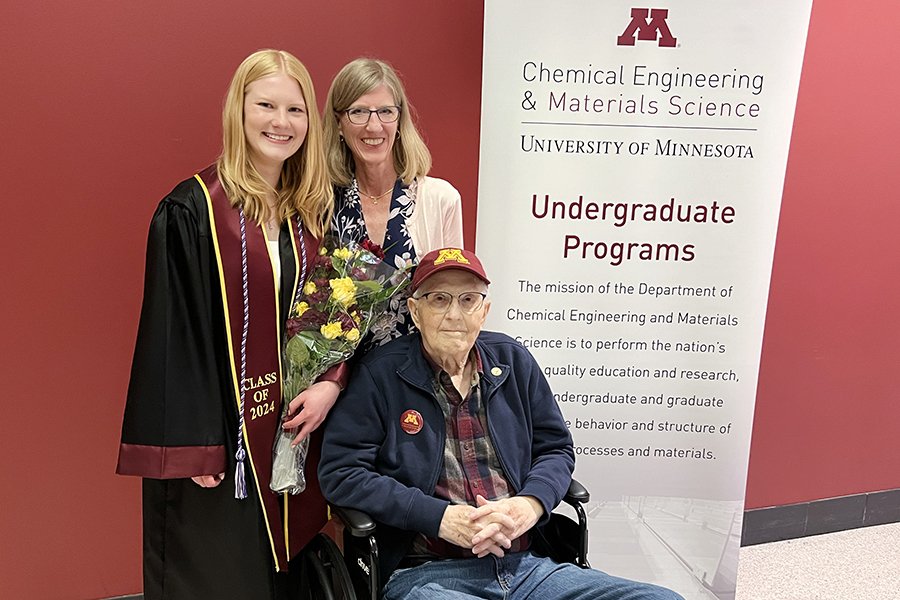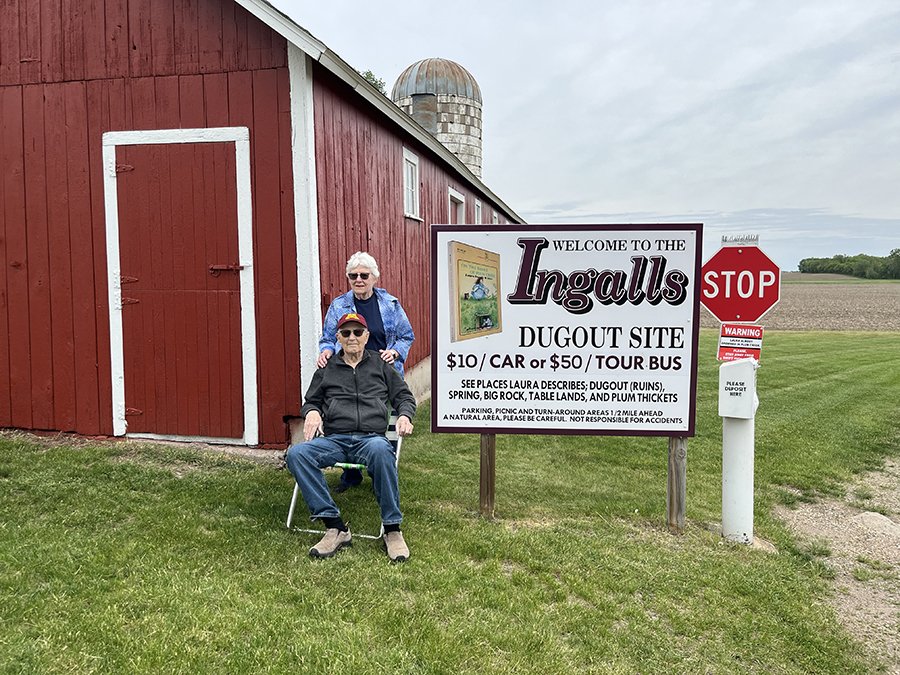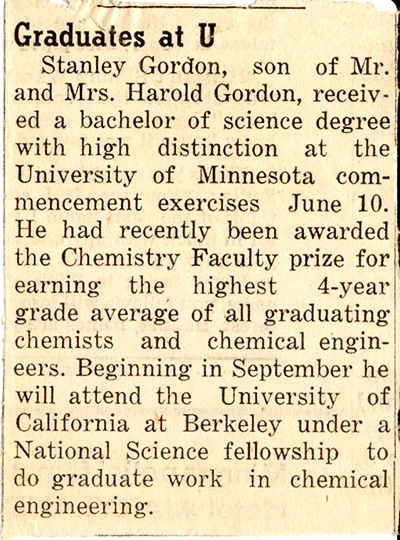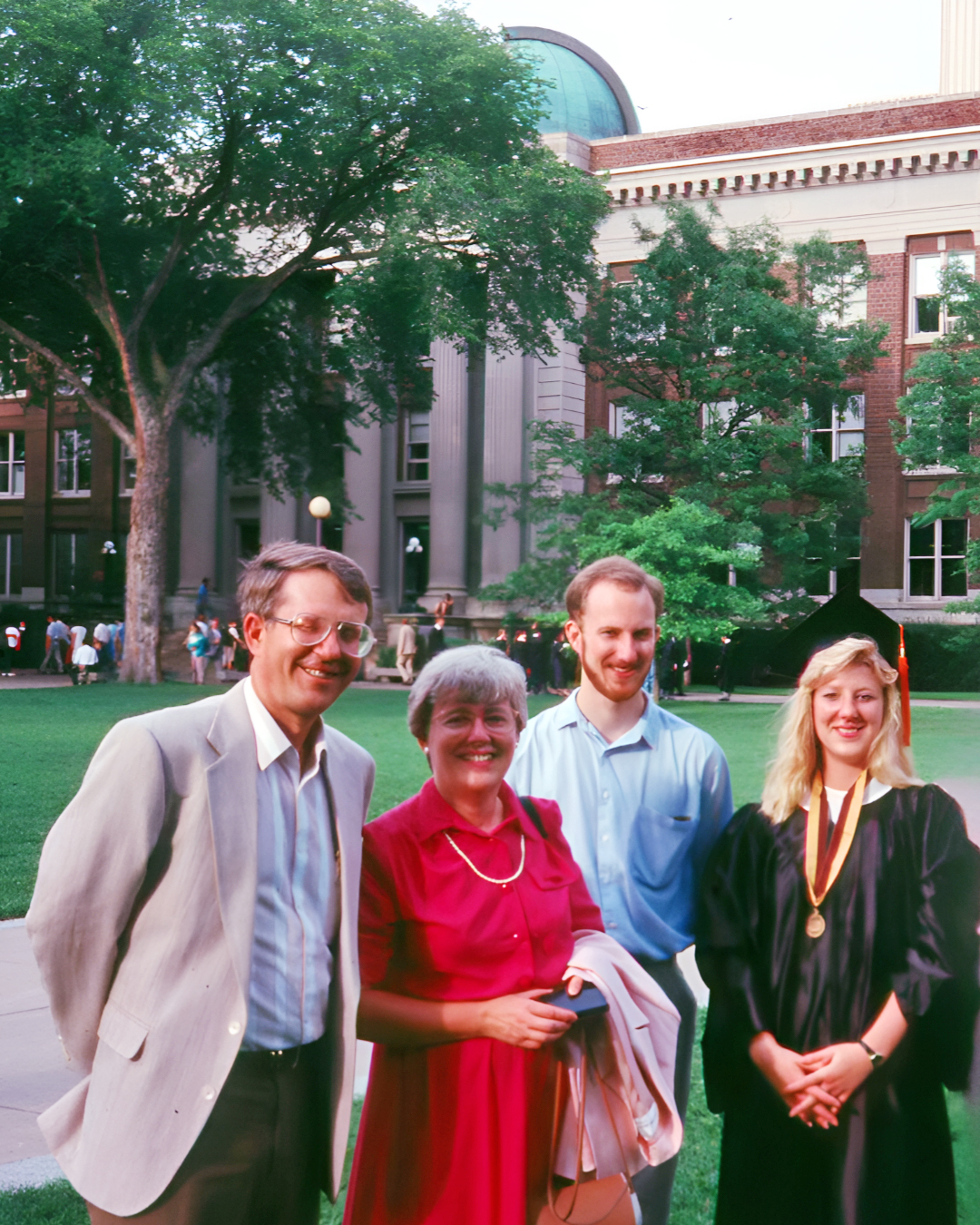Three generations, one passion: When an engineering mindset runs in the family

A true midwestern legacy
In 1947, alumnus Stanley “Stan” Gordon and his family learned that they owned the property formerly belonging to famed author Laura Ingalls Wilder’s family in Walnut Grove, Minn. As the years went on, Stan married Hazelle Gordon and moved away from the farm. His parents gave tours to visitors who knocked on their door.
“Then, in 1974, the TV series ‘Little House on the Prairie’ debuted and that just upset the whole apple cart,” Stan said. “We went from 1,200 visitors a year to 12,000!”
Stan said the overwhelming number of visitors was more than his parents could handle. His family worked with community leaders, and they built a museum in town so people could ask their questions there. In 1996, he and Hazelle retired and refurbished the farm, and they took over the daily operations of the visitors to the “dugout” site where the Ingalls’ home once stood.
“[My daughter] Kristine is going to have the privilege, we hope, of owning this when I pass. So, she’s got her work cut out for her,” Stan said.

A commitment to doing hard things
Similar to the Ingalls family, Kristine “Kris” Klotzbach, who graduated in 1991 with a degree in chemical engineering, does have her work cut out for her. Kris, Stan and Hazelle's daughter, works full-time as a Lean Six Sigma Black Belt process improvement expert at Andersen Corporation. Maintaining the farm for tourists will add significantly to her plate, but Kris isn’t one to shy away from challenges. She has been inspired by the hard work her dad has put into the farm and his career.
“My dad always made a point of saying, ‘You can really do anything if you work hard at it’—and that’s a piece that I’ll take with me forever,” Kris said.
Stan’s strong work ethic and love of lifelong learning started early in life and were evident during his years at the University of Minnesota.
“After four years [of completing my Bachelor of Chemical Engineering at the University of Minnesota], I got a letter in the mail that said congratulations from the faculty. It said I had the highest GPA of all the graduating seniors,” Stan said. “I started to think I can do hard things. And so that's what changed my whole mindset from farm boy to doing hard things.”

Stan said his undergraduate experience prepared him for his career as a chemical engineer at General Mills, director of corporate planning and analysis at Henkel, and as a consultant with Stat-Ease.
“The curriculum [at the University] was very rigorous, and they taught basic principles,” he recalled. “And wherever I went, those principles applied. When I went from working for a company to consulting, I relied on them all the time.”
Like her dad, Kris believes the University of Minnesota’s chemical engineering program provided her with the foundation she needed for success.
“I could get to the root cause and solve really hard problems because I understood those fundamentals,” she said. “I've been able to leverage that and continue to grow my career by being able to solve harder and harder problems or make improvements. My whole job at Andersen is making things better for the people doing the day-to-day work.”
An engineering mindset
When it comes to the third generation, new graduate Emma Klotzbach followed her grandfather’s and mother’s education and career path. She is now starting a career in research and development at H.B. Fuller.
“My family never pushed anything on me,” Emma said. “They definitely just wanted me to explore my options. I saw how successful they both [my grandfather and mother] were and how much they really loved it.”
It was also their engineering mindset—the logical way they both approach problems—that Emma noticed growing up. She finally understood where that came from.
“We were working on the farm not too long ago, and the pump wasn’t pumping,” she explained. “We went through every step singularly to see what the problem was. We checked if it needed to be cleaned, but in the end, it just needed to be primed. Solving problems takes a very thorough process of trying to think of all the different possibilities, and then what could have caused the problem. Now that I’ve gone through the same program at the U, I understand that type of thinking. It just makes sense.”
For Emma’s mom, Kris, that engineering mindset of questioning came early.
"My mom and dad both made a point to foster that desire to learn,” she recalled. "It was very common in our household to ask questions. When my husband joined our family, he recognized that difference—saying something once like ‘Oh, my gosh, my parents would have killed me if I had stopped in the middle of doing a task and asked a question.’”
The Gordons instilled this spirit of inquiry in both Kris and her brother, Lee Gordon, who graduated with a bachelor’s and master’s degree in computer science from the University of Minnesota.

Creating a legacy
Stan received several undergraduate scholarships from the University. He was a Sloan Scholar and was awarded a trip to New York City to meet Alfred P. Sloan Jr., a long-time president, chairman, and CEO of General Motors Corporation.
“It was so great, just a wonderful experience,” Stan said. “And so, if we could set up something like that, I thought, ‘Hey, why not.’ We had no qualms whatsoever about making a significant donation—one that would count.”
In February 2024, the couple established the Stanley and Hazelle Gordon Scholarship in CEMS to support high-potential undergraduates who attended a rural high school or a small high school with fewer resources because the students may not have been given as many opportunities.
“This is just a small token of the gifts I have received over the years,” Stan said. “I was dedicated to making a donation every year. Then as my health declined, we decided to step it up and make it more permanent. I’m in hospice now, so time is running out. It’s time to ‘get ’er done.’”
The inaugural Gordon Scholar, Alec Schwendinger, a double major in chemical engineering and chemistry was awarded at the beginning of the 2024-25 academic year. This scholarship expands the influence of this unique CEMS family’s legacy of dedication, inquiry, and persistence in the face of complex problems.
Editor’s note: We are deeply saddened to share that Stan Gordon passed away in July 2024. Our thoughts are with his family and friends during this difficult time. Stan will be greatly missed by all who knew him.
To support students in the Department of Chemical Engineering and Materials Science, visit our CEMS Giving Opportunities webpage.
